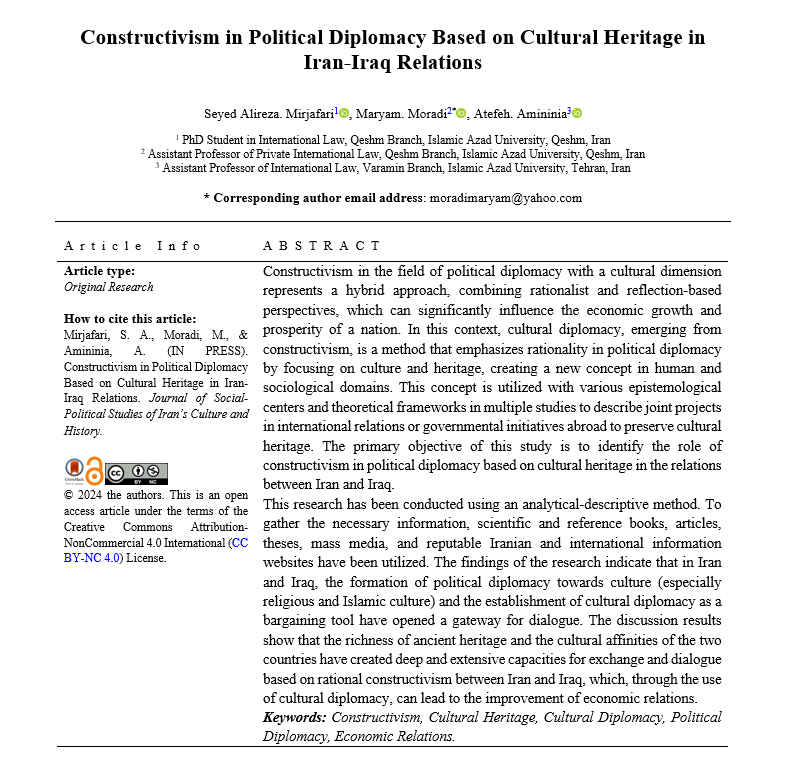Constructivism in Political Diplomacy Based on Cultural Heritage in Iran-Iraq Relations
Keywords:
Constructivism, Cultural Heritage, Cultural Diplomacy, Political Diplomacy, Economic RelationsAbstract
Constructivism in the field of political diplomacy with a cultural dimension represents a hybrid approach, combining rationalist and reflection-based perspectives, which can significantly influence the economic growth and prosperity of a nation. In this context, cultural diplomacy, emerging from constructivism, is a method that emphasizes rationality in political diplomacy by focusing on culture and heritage, creating a new concept in human and sociological domains. This concept is utilized with various epistemological centers and theoretical frameworks in multiple studies to describe joint projects in international relations or governmental initiatives abroad to preserve cultural heritage. The primary objective of this study is to identify the role of constructivism in political diplomacy based on cultural heritage in the relations between Iran and Iraq.
This research has been conducted using an analytical-descriptive method. To gather the necessary information, scientific and reference books, articles, theses, mass media, and reputable Iranian and international information websites have been utilized. The findings of the research indicate that in Iran and Iraq, the formation of political diplomacy towards culture (especially religious and Islamic culture) and the establishment of cultural diplomacy as a bargaining tool have opened a gateway for dialogue. The discussion results show that the richness of ancient heritage and the cultural affinities of the two countries have created deep and extensive capacities for exchange and dialogue based on rational constructivism between Iran and Iraq, which, through the use of cultural diplomacy, can lead to the improvement of economic relations.
Downloads
References
Ahmadi, H. (2003). Iranian National Identity: Foundations, Challenges, and Requirements. Cultural Research Letter, 7(6).
Ashena, H., & Rouhani, M. (2010). Cultural Identity of Iranians: From Theoretical Approaches to Fundamental Components. Cultural Research Quarterly, 3(4).
Black, J. (2010). A History of Diplomacy. Reaktion.
Dinstein, Y. (2009). The International Law of Belligerent Occupation. Cambridge University Press.
Douglast, J. (2003). Experts Please to Pentagon Didn't Save Museum. N.Y Times.
Fahimi Fard, M., Saeedi Jowhadi, H., & Bahadori, M. (2021). The Role of Economic Diplomacy in Developing Economic Cooperation between Iran and Central Asian Countries (Case Study: Khorasan Razavi Province). International Political Economy Studies, 4(2), 769-798.
Fuller, J. (2003). Thief of Iraq's Art Treasure Continuing, Cultural Heritage International. SunTimes.
Ghahremanpour, R. (2004). Constructivism: From International Politics to Foreign Policy. Strategic Studies Quarterly, 7(24), 299-318.
Ghasemi, H. (2009). Iranian Culture and Globalization: Opportunities and Challenges. Proceedings of the First International Conference on Iranian and Global Developments, Tehran.
Javadi Arjmand, M. J., Naderi, M., & Davoudi, M. (2012). Iran's Cultural Diplomacy in Iraq and Future Prospects of Bilateral Relations. New Perspectives in Human Geography, 4(3).
Karami, J. (2004). Foreign Policy from the Perspective of Social Evolutionism. Strategy Magazine, 31.
Lähdesmäki, T., & Čeginskas, V. L. (2022). Conceptualisation of Heritage Diplomacy in Scholarship. International Journal of Heritage Studies, 28(5), 635-650. https://doi.org/10.1080/13527258.2022.2054846
Miri Nam Niha, M., & Omidi, A. (2022). Analysis of UNESCO's Cultural Policy and Its Role in Connecting the Iranian Cultural Civilization Sphere. International Studies Quarterly, 19(1).
Mokhles, S., Nejati Hosseini, M., & Ahmadi, O. A. (2023). Herbert Marcuse's Theory of Culture and Rationality. International Political Economy Studies, 6(1), 165-191.
Nargesi, S., Babaki, R., & Efti, M. (2020). Examining the Relationship between Tourism, Economic Growth, and Financial Development in Iran (1989-2016). Financial Economics Quarterly, 12(44).
Pakayin, M. (July 23, 2008). Iran and Iraq on the Path of Cultural Relations Development. https://jamejamonline.ir/fa/news/189964
Petraeus, G. D. H. (2007). Commander, Multi-National Force-Iraq Joint Hearing of the U.S. House of Representatives Committee on Foreign Affairs and the Committee on Armed Services.
Pourali, P. (2021). Approaches to Iran's Cultural Diplomacy in Iraq after the Fall of Saddam. Political Studies of the Islamic World, 11(1).
Shaika, K. D. (2003). Iraq Museum Reopens with Assyrian Treasure. N.Y Times.
Trötschel-Daniels, B. (2022). Cultural Diplomacy and Cultural Heritage: Envisioned, Refused, Denied, Accomplished (1889-1969). In Culture as Soft Power. De Gruyter. https://doi.org/10.1515/9783110744552-013

Downloads
Published
Submitted
Revised
Accepted
Issue
Section
License
Copyright (c) 2025 Seyed alireza Mirjafari (Author); Maryam Moradi (Corresponding Author); Atefeh Amininia (Translator)

This work is licensed under a Creative Commons Attribution-NonCommercial 4.0 International License.








